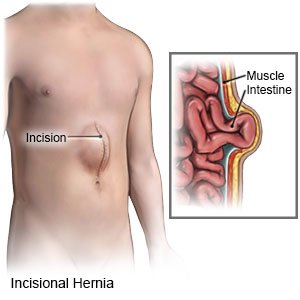Incisional Hernia
Medically reviewed by Drugs.com. Last updated on Apr 6, 2025.
What is an incisional hernia?
An incisional hernia is a bulge through the healed incision of a past surgery in your abdomen. An incisional hernia is usually caused by weakness in the tissues and muscles of your abdomen. The bulge is usually caused by a part of your intestine, but it may also be tissue or fat pushing through the weakness.
 |
What increases my risk for an incisional hernia?
- Older age
- Obesity
- Pregnancy
- Past infection at the incision site
- Smoking
- Straining during bowel movements, coughing, or heavy lifting
- Medicines, such as steroids
What are the signs and symptoms of an incisional hernia?
- Pain
- Nausea or vomiting
- Swelling or a soft bulge along your old incision
- Bloating
How is an incisional hernia diagnosed?
Your healthcare provider will look and feel for a bulge in your incision. You may be asked to cough while standing up. You may need a CT scan to show the hernia. You may be asked to drink contrast liquid to help the hernia show up better in the pictures. Tell the healthcare provider if you have ever had an allergic reaction to contrast liquid.
How is an incisional hernia treated?
Treatment depends on your symptoms and size of the hernia. Your provider may tell you to wear a hernia belt to prevent the hernia from bulging. You may need surgery if your hernia is large or is affecting your daily activities.
How can I help prevent another incisional hernia?
- Maintain a healthy weight. Ask your healthcare provider what a healthy weight is for you. Your provider can help you create a weight loss plan, if needed. Ask your provider what foods are best for you.
- Do not strain. This includes when you have a bowel movement. Take an over-the-counter bowel movement softener and drink liquids as directed. Ask how much liquid to drink each day and which liquids are best for you. When you cough, hold a pillow against your incision to prevent strain.
- Do not smoke. Nicotine and other chemicals in cigarettes and cigars can slow healing. Ask your healthcare provider for information if you currently smoke and need help to quit. E-cigarettes or smokeless tobacco still contain nicotine. Talk to your healthcare provider before you use these products.
- Wear your support device as directed. You may need to wear a support device, such as an abdominal binder, for up to 2 weeks after surgery. This helps decrease pain and the risk of fluid collecting under your skin.
- Return to your usual activities as directed. Do not lift more than 10 pounds or do strenuous activity until your provider says it is okay.
When should I seek immediate care?
- You have severe pain.
- Your abdomen is suddenly very hard.
- Your heart is beating faster than usual.
- You have bloody bowel movements.
- You stop having bowel movements or passing gas.
When should I call my doctor?
- You have a fever.
- You have nausea and are vomiting.
- You are constipated.
- Your hernia has returned.
- You have a lump, or collection of fluid, under your skin.
- You have pain that does not go away, even after you take pain medicine.
- You have questions or concerns about your condition or care.
Care Agreement
You have the right to help plan your care. Learn about your health condition and how it may be treated. Discuss treatment options with your healthcare providers to decide what care you want to receive. You always have the right to refuse treatment. The above information is an educational aid only. It is not intended as medical advice for individual conditions or treatments. Talk to your doctor, nurse or pharmacist before following any medical regimen to see if it is safe and effective for you.© Copyright Merative 2025 Information is for End User's use only and may not be sold, redistributed or otherwise used for commercial purposes.
Learn more about Incisional Hernia
Treatment options
Symptoms and treatments
Further information
Always consult your healthcare provider to ensure the information displayed on this page applies to your personal circumstances.
